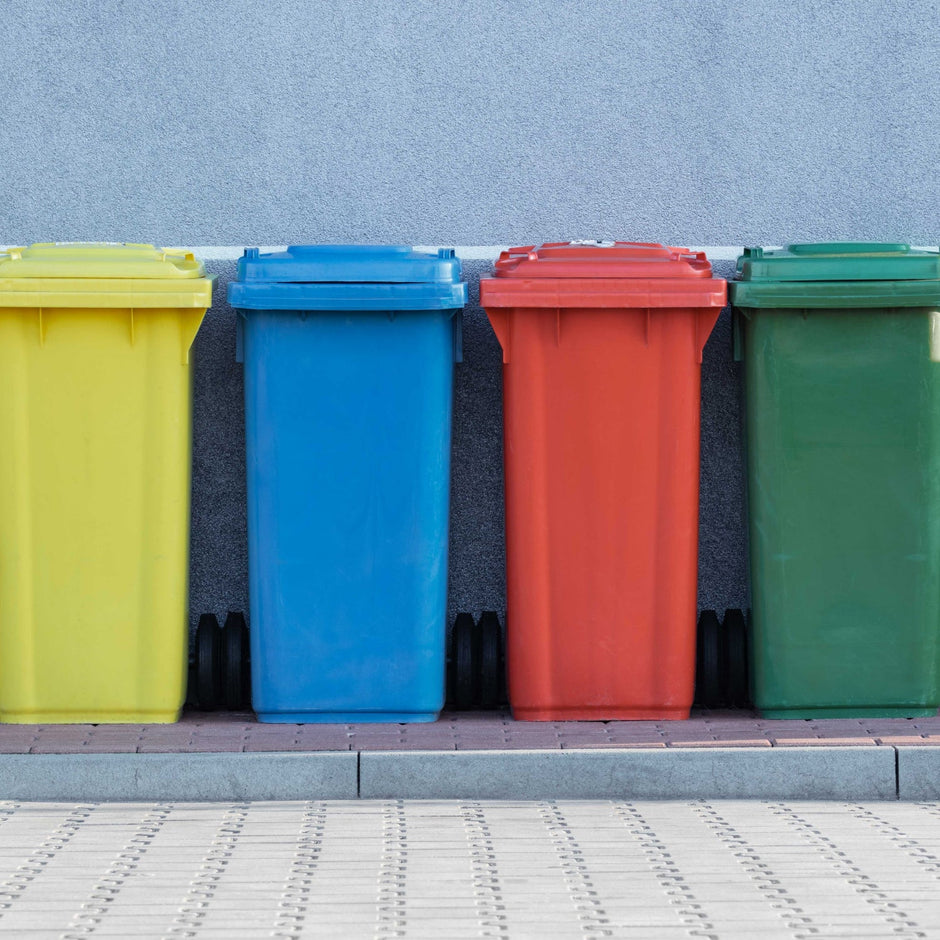Diaper Disposal - Yellow Bag, Organic Waste, or General Trash Bin?
Updated on:
Photo by Pawel Czerwinski on Unsplash
Over the past century, reusable diapers made of cloth have been replaced by today’s disposable diapers. However, this solution results in mountains of waste. On average, a child needs about 5,000 diapers before becoming potty trained. It gets even worse if these are disposed of incorrectly, making important recycling processes more difficult or even ending up in nature.
Do used diapers belong in the yellow bag? No. Due to their composition and the fact that they contain human waste, used diapers must be disposed of as general waste. This also applies to bio- and eco-diapers.
Below, we'll explain how to properly dispose of used diapers, what you need to be aware of, and how you can avoid the waste problem altogether.
Proper Disposal of Diapers – How it's done
Even though disposable diapers are mostly made of plastic and cellulose, they do not belong in plastic waste. Since both components are either not or very difficult to biodegrade, organic waste is also the wrong choice for disposing of used diapers. The Circular Economy Act also stipulates that human excretions must never be disposed of in organic waste.
In Germany, used diapers belong in general waste.

Photo by Mahesh Patel on Pixabay
Do bio and eco-diapers belong in organic waste?
Even if you might initially assume that bio and eco-diapers can be disposed of in organic waste, this is not the case. Unlike other disposable diapers, these contain a higher proportion of biodegradable materials and are made from sustainable resources. However, even these are not fully biodegradable. And even if they were: since diapers contain human waste, they must only be disposed of as general waste.
Also, wet wipes used during diaper changes belong in general waste. You should never flush them down the toilet, as they do not dissolve and can clog pipes. If you use wet wipes to clean your child’s hands or face, however, you can of course dispose of them in the yellow bag.
Diaper bags and diaper bins
Over the course of the diaper phase, the average child uses about 5,000 diapers. In many households, the general waste bin is already overflowing just a few days after being emptied.
Many German cities offer alternatives: You can receive special trash bags or even diaper bins from your city or local authority, which are specifically intended for collecting used diapers and are collected separately. This saves you space in your main garbage bin and the diapers will be disposed of properly. Please check with your city or local authority for details.
Are compostable diapers the future?
With ongoing research and development, compostable diapers could play a role in the future. These should be able to be disposed of on your compost heap after use and decompose there. A clear problem, however, is that very few people actually have their own compost where they could dispose of diapers, especially in large quantities.

Photo by @madame.vio
Cloth diapers – the alternative to mountains of waste
At this point in time, your main choice is between disposable and reusable diapers. A single disposable diaper takes around 500 years to fully decompose. Well, actually the microplastics from the diaper will remain and continue to pollute our planet.
You can avoid this waste problem by choosing cloth diapers. At Judes , we make switching over especially easy, because our cloth diapers are designed to be just as easy to use as disposables: Take off the used diaper, put on a fresh one, done. The key difference is that the used diaper doesn't go into the trash, but into the wash. After washing, they can be used again. Many times over in fact—our diapers can be used for an entire diapering period or even longer.
For example, we cloth diapers with my son until he was potty trained, and when my daughter was born, they were used again. Afterwards, we were even able to sell them on, and they are still in use today.
Judes cloth diapers are based on a well-thought-out system and are very easy to use. An inner diaper made of 100% organic cotton catches your child's waste and is then washed. A waterproof outer diaper ensures the diaper does not leak, but still allows airflow. This can be aired out and reused several times before it needs to be washed.
We at Judes are a young start-up company with the mission of developing the world's simplest cloth diaper. Many parents feel we've succeeded in this goal. Judes are just as easy to use as disposable diapers. Some users even report that they find them even easier to use.
Conclusion
As you now know, used diapers do not belong in the yellow bag. Organic waste is not a suitable place either. Used diapers should only be disposed of in general waste or special diaper bags or bins.
Perhaps you are also considering how you can save the earth from being completely covered in waste? To save our planet and all the living things on it and secure our children a future without mountains of trash, we should also rethink diapers. A single disposable diaper takes 500 years to decompose, and even then leaves behind so-called microplastics. With 5,000 diapers typically needed for a child up to potty training, that means incredible amounts of waste – which can be avoided! You can read more about the sustainability of cloth diapers in our blog.
Our cloth diapers are just as easy to use as disposables. Instead of ending up in the trash, after use they go straight into the washing machine and can be reused again and again. This way, you protect the environment and benefit from many other advantages.

